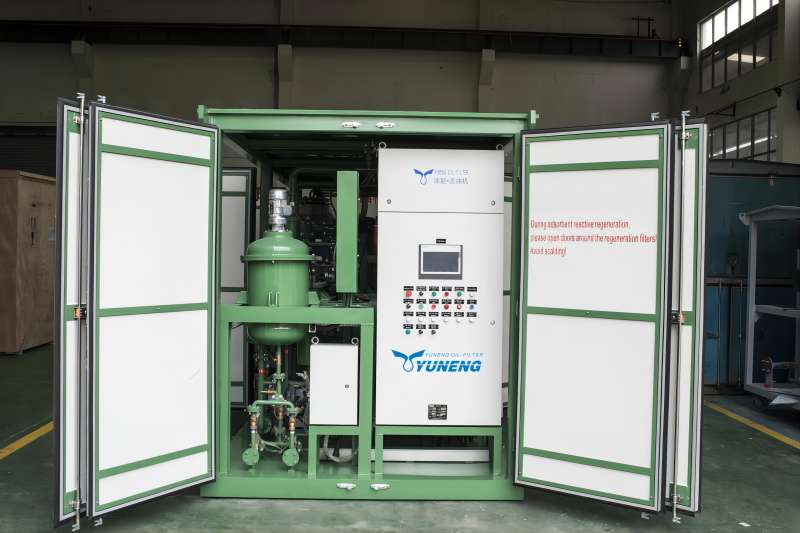Why Transformer Oil Regeneration Is Necessary for Performance
How Regenerated Transformer Oil Extends Transformer Life-span
The duty of transformer oil is essential in making sure the integrity and longevity of transformers, functioning as both an insulator and coolant. Regenerated transformer oil supplies a compelling service to boost these functions by successfully eliminating hazardous contaminations that compromise efficiency. Via a careful regeneration process, the oil's dielectric buildings and thermal stability can be restored, resulting in significant renovations in functional effectiveness. Recognizing the ins and outs of this procedure and its more comprehensive implications for transformer maintenance exposes a pathway to not just prolong life expectancy yet additionally optimize costs in energy administration systems.
Importance of Transformer Oil
Transformer oil plays a vital duty in the efficient procedure of electric transformers. It largely functions as a protecting tool, making sure and preventing electrical discharges that parts run securely under high voltage problems. The oil's dielectric buildings are fundamental to keeping the honesty of the transformer, as they decrease the danger of failures that can result in disastrous occurrences or pricey downtimes.
Along with its protecting abilities, transformer oil also operates as a coolant. As transformers run, they generate heat that must be dissipated to stop overheating and subsequent damages. The oil circulates within the transformer, taking in and moving warmth far from crucial components, thereby preserving optimal operating temperature levels.
Moreover, transformer oil works as an obstacle against wetness and impurities, which can compromise the performance and long life of the transformer. Its chemical buildings help in neutralizing acids and other by-products that may form gradually, adding to the overall health of the electric system.
Advantages of Regenerated Oil

In addition, regenerated transformer oil has a lower degree of contaminations, including bits and contaminants that can break down performance. This purity not only enhances the oil's thermal conductivity but also prolongs the functional life expectancy of transformers by minimizing overheating threats. The improved thermal security of restored oil guarantees consistent efficiency also under high operating temperatures, which is important for keeping transformer performance.
Another advantage is its ecological impact. Restored oil promotes sustainability by decreasing waste and the requirement for brand-new oil production, thus decreasing the carbon footprint related to transformer maintenance. Transformer Oil Regeneration Plant. The longevity of regenerated oil translates to reduced upkeep costs over time, as fewer oil changes and less constant devices downtime are called for.
Process of Oil Regrowth
The regrowth of transformer oil includes a methodical process created to recover the oil's original residential or commercial properties and improve its efficiency. This process normally starts with the removal of the made use of oil from the transformer, which is then based on different purification techniques.
The initial step in the regrowth process is the filtering, where strong impurities such as sludge, metal, and dust fragments are removed. This is you can try these out typically followed by vacuum distillation, which aids to remove wetness and unstable substances, therefore boosting the oil's dielectric toughness.

Influence On Transformer Performance
Restoring the residential or commercial properties of regenerated transformer oil significantly influences the overall performance of transformers. Boosted dielectric toughness is one of one of the most important advantages, as it allows for much better link insulation and lowers the chance of electric break down. This enhancement causes a much more secure procedure under high voltage problems, ultimately bring about raised effectiveness.
Additionally, the removal of impurities and degradation items during the regrowth process minimizes the threat of overheating. Cleaner oil helps with better warm dissipation, which is necessary for keeping ideal operating temperatures. As a repercussion, the thermal performance of the transformer is boosted, permitting higher tons without endangering reliability.
Moreover, the chemical security of regrowed oil makes certain extended operational life. It resists oxidation and destruction, decreasing the frequency of upkeep interventions and oil substitute. This security not only adds to boosted performance but likewise aligns with sustainability objectives by minimizing waste.
Future of Transformer Maintenance
As developments in innovation continue to reshape the landscape of electrical engineering, the future of transformer maintenance is positioned for significant improvement. The integration of wise modern technologies, such as IoT sensors and anticipating analytics, enables real-time tracking of transformer health, boosting the capability to preemptively deal with issues before they rise into major failures. This proactive technique not only maximizes operational performance but also extends the life-span of transformers.
Additionally, the application of fabricated intelligence (AI) in information analysis permits even more precise fault detection and diagnosis. By leveraging artificial intelligence algorithms, upkeep teams can recognize patterns in operational information that human analysts may forget, leading to more educated decision-making.
In addition, the fostering of environment-friendly methods, consisting of the use of regenerated transformer oil, is established to redefine upkeep procedures. This sustainable approach not only minimizes ecological impact however also improves the total health of the transformer.
Finally, the shift in the direction of automation in upkeep procedures is anticipated to improve procedures, decrease downtime, and lower expenses. As these advancements remain to progress, the future of transformer upkeep will undoubtedly end up being a lot more effective, trusted, and lasting, making certain the honesty of vital electrical infrastructure.
Final Thought
The utilization of regenerated transformer oil dramatically enhances the functional longevity of transformers. Ultimately, the adoption of regrowed oil stands for a pivotal advancement in transformer maintenance, making certain optimum efficiency and sustainability in the management of electric infrastructure.
The function of transformer oil is essential in guaranteeing the dependability and durability of transformers, Going Here offering as both an insulator and coolant.Transformer oil plays a crucial role in the effective procedure of electric transformers. Restored oil promotes sustainability by reducing waste and the demand for new oil production, thereby lowering the carbon impact connected with transformer upkeep.Recovering the buildings of regenerated transformer oil significantly affects the total performance of transformers.The utilization of regenerated transformer oil substantially improves the operational durability of transformers.